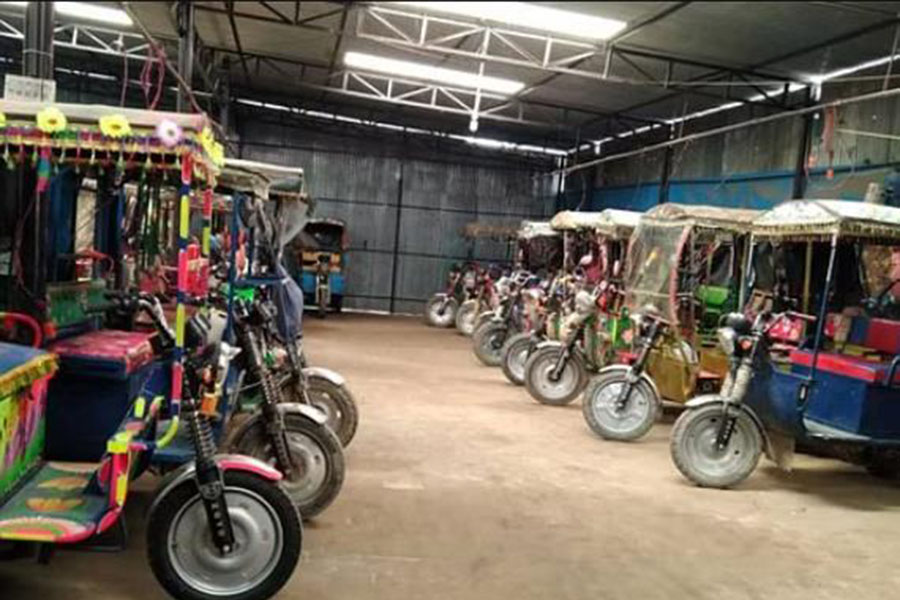How lithium batteries are transforming public transport in Bangladesh

Published :
Updated :

When M Stanley Whittingham, John Goodenough, and Akira Yoshino were independently working on the development of stronger rechargeable batteries in the 1970s and 1980s, little did they realise that their efforts would one day revolutionise the technology and become a vital cog in the wheel of environmental sustainability.
Their groundbreaking work, which earned the trio a joint Nobel Prize in Chemistry in 2019, paved the way for leading auto manufacturers, such as Tesla, Mitsubishi, Audi, and Toyota, to develop today's lithium-ion batteries to power electric cars, which are gaining popularity worldwide due to their environmental friendliness, reports bdnews24.com.
During his Nobel Prize acceptance speech in Stockholm, Goodenough, who passed away last month in Texas, said, "We thought it would be nice and helpful in a few things, but never dreamed it would revolutionise electronics and everything else."
Bangladesh, too, is making strides in the green energy game by using lithium-ion batteries in locally made public transport. Over the past decade, battery-powered "Easy bikes" or "Tomtoms", as they are locally known, have become a popular means of public transportation, particularly outside Dhaka.
According to data from the German Agency for International Cooperation, there are currently at least three million such vehicles operating on Bangladeshi roads, with at least 75 percent of the entire population of Bangladesh using them at least once a day.
These vehicles currently use lead-acid batteries based on 19th-century technology to power them.
Compared to lead-acid batteries, however, lithium-ion batteries are smaller, have a longer life cycle, and require less time to recharge.
The only drawback of lithium-ion batteries is that they are slightly more expensive than alternatives. But now, companies like SOLshare are stepping forward to help remedy that issue as well.
Under a flagship programme, SOLshare, a self-styled climate-tech company, has developed a business model to power Easy bikes or Tomtoms across Bangladesh with lithium-ion batteries. They are collaborating with credible microfinance institutions in the country to extend loans to the ride owners at a low interest rate.
Salma S Islam, head of project (fundraising and communication) at SOLshare, says that the company has already installed lithium-ion batteries in Easy bikes across 23 garages located in Dhaka, Sylhet, Rajshahi, Bogura, and Cox's Bazar.
According to her, a single lithium-ion battery can do the job of five lead-acid batteries, with better durability to boot.
"While it requires at least five lead-acid batteries to power an Easy bike, the same output can be achieved with just one lithium-ion battery. Moreover, lead-acid batteries hardly last a year, while lithium-ion batteries last at least five years.
"The ride owners were getting trapped in a vicious cycle of defaulting on small loans as the lead-acid batteries lost viability before they could repay the loans. They were also paying a high interest rate since there were hardly any mainstream lenders for this industry. The owners ended up resorting to loan sharks who charge exorbitantly high interest rates and set very tight repayment deadlines," she explained.
SOLshare addressed these issues by connecting ride owners with credible microfinance institutions, which provide loans at a minimum interest rate.
"And since the batteries last longer, the owners face minimal risk of defaulting on their loans," said Salma.
‘SMART’ LITHIUM-ION BATTERIES
SOLshare has taken it a step further by inserting a chip into the batteries, transforming them into "smart" batteries. This chip, patented in Bangladesh, allows owners to remotely control the battery's functionality via the internet, set a maximum speed limit for the vehicles, and monitor usage data, including mileage and battery life cycle.
According to Isa Abrar Ahmed, SOLshare's director of product and business development, the chip also helps microfinance institutions ensure loan repayments.
"If the ride owners fail to pay a loan instalment, the chip will block the battery from powering the vehicle. Moreover, if the chips are tampered with, the battery's viability can be reduced by up to 70 percent," he explained.
GREEN FINANCING
To further support the industry, Abrar emphasised the need for state intervention.
"Currently, microfinance institutions are extending small loans at a 20 percent interest rate. If Bangladesh Bank supports our programme through its green financing initiative, the ride owners can obtain loans at 4 percent interest, which will attract more owners to sign up for the programme," he said.
SOLshare's target is to install lithium-ion batteries in at least 15,000 more Easy bikes over the next three years, contributing to the expansion of green energy solutions in Bangladesh.


 For all latest news, follow The Financial Express Google News channel.
For all latest news, follow The Financial Express Google News channel.